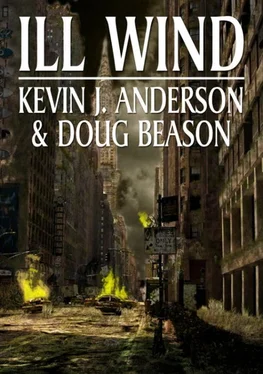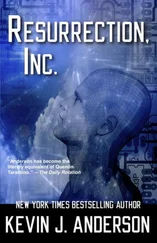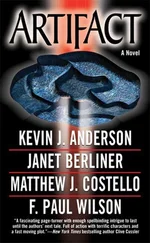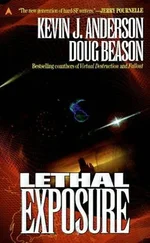She stared at the typewriter. “You told me to type these, Al.”
He rolled his eyes and sighed at her. His face reminded her of a llama’s. “You’re doing it again, Heather: thinking. Just do what I tell you to do. You don’t need to think.”
She was thinking all right, thinking about jamming a metal wastebasket on Al Sysco’s head and doing a tap dance on his temples.
Stacie finally staggered into the office a little after noon. She had ridden her bicycle on the rims of two flat tires. “Crazy people out in the streets. Nobody knows what to do!” Heather took no consolation in listening to Al yell at Stacie.
When she pulled out her lunch sack to unwrap a tuna sandwich, the plastic bag had turned into goo, seeping into her bread. Heather stared at it. The plague was working its way through the office, floating through the air, attacking anything it could eat.
She looked at the fake wood-grain coating on her metal desk, at the plastic pens in her cup, at the plastic knobs on her office chair, at the plastic buttons on her clothes. What next ? At any moment, some key support component in the Surety building itself might fall apart, causing the walls and ceiling to crash in.
She did not want to stay here another minute.
She picked up the phone in a reflex action as Sysco charged back to her desk. “Heather, take over my station. I have to meet with the crisis team. Might take me an hour.”
Heather straightened in her seat, still clutching the phone. As her anger grew, her pastel-pink fingernails made deep indentations into the softening plastic of the telephone handset.
“Sorry, Al, but I’m not qualified to do that kind of work. I might botch it up. I don’t dare touch it.” She stood up, cold and calm inside. The eye of the storm.
“What did you say? I don’t have time for this, Heather!” Sysco’s eyes looked as if they might pop right out of their sockets. “This is important—”
Heather snatched her lunch sack and handed it to him. The dissolving plastic had made a creeping stain on the brown paper bag. “Here, Al—have a tuna sandwich.” She turned to Stacie. “I wouldn’t put up with this creep any longer than you have to, Stacie. See ya.”
She wanted to watch Sysco’s expression turn splotched and livid as she strode to the stairwell, but she did not dare turn around. Her legs shook as she hurried down the echoing concrete steps. Her shoes felt strange, as if they no longer fit right. Great! Her heels would probably dissolve before long.
She left the Surety Insurance headquarters building, doubting she would ever set foot inside again.
Out in the parking lot, she marched onto the hot pavement, forcing herself not to run, ignoring the ache in her calves, giving no thought to the long walk facing her before she reached the safety of home. The world might be falling apart, all right, but she didn’t feel any particular attachment to the old order of things. She could leave it behind with no regrets. Screw them all. It was time to take care of herself.
Sitting in the reserved parking space, Al Sysco’s silver Porsche gleamed in the sun. He had owned it less than three months, and he still washed and waxed it every weekend. He had bought it to celebrate stealing her promotion, and she knew it.
She stared at the Porsche. It looked like a snarling metallic insect. Insects were for squashing, weren’t they?
Heather opened her canvas purse and pulled out the nearly full bottle of pastel-pink nail polish. She hated the color, hated nail polish in the first place; she wore it only as part of professional dress in the insurance company. Now she had a better use for it, if the plague didn’t somehow dissolve the enamel first. She twisted off the softening cap and dribbled the enamel in swirls over the driver’s side windshield. Once the nail polish baked a few hours in the hot Arizona sun, Albert “You can call me Al!” Sysco would need an ice pick to get it off.
“You can call me vindicated , Al,” she said, then set off for home, on foot.
* * *
Al Sysco fled the Surety Insurance headquarters at seven o’clock that evening. Everyone else had left hours before, but he was in charge. He was the responsible man on the job. The entire day had been hell. The California gasoline plague kept getting worse, showing up in all parts of the world, according to the reports. Industry was in a panic, big cities were in turmoil—and it seemed as if every human being on planet Earth wanted to take it out on him.
Dusk had fallen, and the streetlights stood dark and dead. The power had flickered on and off all afternoon, and Sysco wondered if dissolving electrical insulation would end up starting fires. One more thing for the insurance company to worry about!
Heather Dixon had walked out in the middle of the day, and Al vowed to see her fired as soon as all this was over with—but right now he prayed she would come back.
Stacie was a slow and plodding worker, and Candace was just a trainee. They couldn’t do anything right, and Candace had spent half the day in tears. He had physically shaken her by the shoulders, yelling that they were in a crisis situation, dammit! It didn’t do any good. He could not survive another day like this one. He wished somebody would start solving this plague problem.
He stopped in front of his Porsche, and his mouth dropped open. In the dim light, it looked like a gigantic glob of birdshit had splattered his windshield. He looked closer. “Nail polish! Sweet as an armpit! Gawd!” He tapped it with his nails, but the opaque pink coating could have been electroplated on.
Sick to his stomach, he climbed behind the steering wheel. He just wanted to go home and work his way through every beer in the refrigerator, then start on whatever else he could find in the liquor cabinet.
But when he turned the key in the ignition, his car refused to start.
Todd moved through Alex Kramer’s empty house, not quite sure what he should do now. He had been here for days, flustered to be in a situation where the plan of action was not obvious, and the most sensible thing seemed to be just sitting tight. He wanted to get off his butt and do something.
Bending down in front of the cold fireplace, Todd riffled through the ashes, pulling out the scorched chunks of Alex’s Prometheus notes. A handful of pages were intact.
Todd paced the floor. It was deceptively calm and peaceful here, but he knew the chaos was growing in the cities, on the clogged freeways.
When he had called the ambulance to report Alex’s suicide, it had taken them five hours to reach the home out in the Marin hills. Todd had yelled at the harried-looking blond man in grimy blue-and-white paramedic uniform, but the man snapped back that only one of their vehicles worked, and that they had answered dozens of calls. The paramedics covered Alex’s body and carried it out to the ambulance, slamming the back doors. The driver pulled out, spraying gravel from the rear tires as Todd stood speechless on the porch.
With nothing else to wait for, Todd had left Alex’s house, locking the front door behind him. But when he had tried to drive to Stanford to meet Iris, his Ford pickup broke down after only five miles. He had stared at the ticking, motionless hulk parked on the side of the road, tires wrenched in a sharp angle. He had shaken his head, turned his back, and started the hike back, angry, confused, and afraid. His cowboy boots crunched on the road’s soft shoulder, and not many cars passed him.
What a day!
Letting himself back in through the jimmied laundry-room window, Todd had gone to Alex’s phone and called fifteen emergency road service numbers, finally getting one that told him to wait.
Читать дальше












